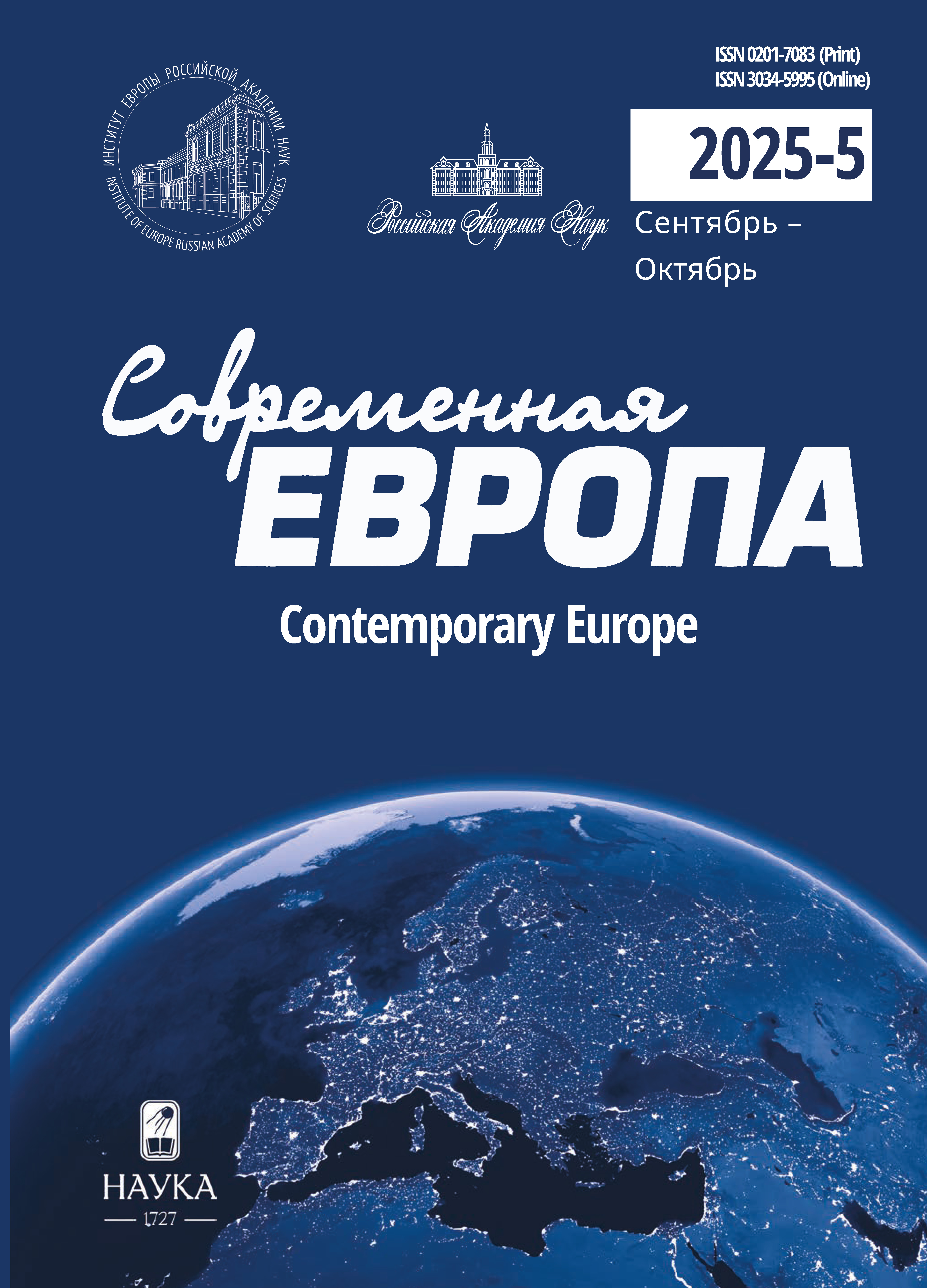№ 4 (125) (2024)
ЕВРОПЕЙСКИЙ ПРОЦЕСС: СТРАНЫ И РЕГИОНЫ
THE ROLE OF TRANSFORMATIVE PROJECTS IN EUROPEAN UNION INTEGRATION DYNAMICS
Аннотация
This paper introduces a new approach to understanding the deepening of integration. It examines how and under what conditions the implementation of large projects drives integration dynamics. The study begins by analyzing the demand and supply logic that underlies the explanatory integration theories, primarily two grand theories – neofunctionalism and liberal intergovernmentalism. Both theories agree that the demand for integration is crucial but differ on the nature of interest groups (purely national vs. national and transnational), the levels at which these groups demand integration (only national vs. national and transnational), and the role of supranational institutions. Both theories acknowledge the key role of member state governments at the polity level. Neofunctionalism and institutionalism recognize the role of governments at the level of politics as well, at least when studying significant reforms of specific EU policies. National policymakers are usually ready to deliver the supply of integration (political decisions) when these decisions provide them sufficient compensation for any loss of their autonomy, usually in the form of additional pubic or elite support. What characteristics should a new integration project have in order to accumulate the demand, push politicians to deliver the supply, and be able to trigger the systemic transformation of regional integration organizations like the EU? The study proposes the concept of a transformative project – a type of integration project that can significantly impact integration dynamics and entail systemic changes in governance, polity, and degree of policy coordination. Based on an analysis of the EU’s history, we outline the key characteristics of a transformative project, including complexity to induce a spillover effect, a practice-oriented nature combined with long-term political goals, broad support among stakeholders and society, tangible benefits that impact daily life to promote socialization, a solid groundwork (experience with regulation at the supranational level), and linkage to a global context. The author concludes with several assumptions about the potential of the EU Green Deal as a transformative project.
 5‒16
5‒16


ФРАНЦУЗСКАЯ СТРАТЕГИЯ ПОМОЩИ РАЗВИТИЮ: ОСОБЕННОСТИ АФРИКАНСКОГО НАПРАВЛЕНИЯ
Аннотация
 58-72
58-72


МНОГОСТОРОННЯЯ ГУМАНИТАРНАЯ ПОМОЩЬ КАК ИНСТРУМЕНТ ВНЕШНЕЙ ПОЛИТИКИ БРИТАНИИ
Аннотация
 45-57
45-57


ИСКУССТВЕННЫЙ ИНТЕЛЛЕКТ В ПОЛИТИКЕ ЕС И КНР
Аннотация
 30-44
30-44


РЕФОРМА ПРЕЮДИЦИАЛЬНОЙ ПРОЦЕДУРЫ В СУДЕБНОЙ СИСТЕМЕ ЕВРОПЕЙСКОГО СОЮЗА
Аннотация
 17-29
17-29


ПРОБЛЕМЫ ЭКОНОМИКИ
МИРОВОЙ РЫНОК УГЛЯ: СОСТОЯНИЕ И ДОЛГОСРОЧНЫЕ ТЕНДЕНЦИИ
Аннотация
 116-125
116-125


ФАКТОРЫ ВНЕШНЕТОРГОВОЙ РЕЗИЛЬЕНТНОСТИ СТРАН ЕВРОПЫ В УСЛОВИЯХ ГЛОБАЛЬНОЙ КОНКУРЕНЦИИ: РОЛЬ ВНУТРИОТРАСЛЕВОЙ ТОРГОВЛИ
Аннотация
 100-115
100-115


МЕХАНИЗМЫ ВАЛЮТНОГО СОТРУДНИЧЕСТВА В БРИКС: ПЕРВЫЕ РЕЗУЛЬТАТЫ И НОВЫЕ ВЫЗОВЫ
Аннотация
 87-99
87-99


ЕС КАК ТОРГОВАЯ СИЛА: НАСТРОЙКА ИНСТРУМЕНТОВ ВНЕШНЕЭКОНОМИЧЕСКОЙ ПОЛИТИКИ
Аннотация
 73-86
73-86


СОЦИАЛЬНАЯ СФЕРА
САМОЗАНЯТЫЕ ИЛИ НАЕМНЫЕ: ПРОБЛЕМА РЕГУЛИРОВАНИЯ ПЛАТФОРМЕННОГО ТРУДА В ЕС
Аннотация
 126-139
126-139


СОЦИАЛЬНАЯ ЭКОНОМИКА ЕС: ПУТЬ К ПРЕОДОЛЕНИЮ НЕРАВЕНСТВА?
Аннотация
 140-150
140-150


ЭКОЛОГИЧЕСКОЕ ИЗМЕРЕНИЕ СОВРЕМЕННОЙ ЕВРОПЕЙСКОЙ КУЛЬТУРЫ
Аннотация
 151-159
151-159


ОБЩЕСТВО И РЕЛИГИЯ
КАТОЛИЧЕСКАЯ ШКОЛА КАК МОДЕЛЬ ВЗАИМОДЕЙСТВИЯ ЦЕРКВИ И ГОСУДАРСТВА В ИТАЛИИ
Аннотация
 160-174
160-174


ИСТОРИЯ И СОВРЕМЕННОСТЬ
RUSSIA/USSR – TÜRKIYE/TURKEY: LEGACY OF “FRIENDLY NEUTRALITY” GOALS OF SOVIET POLICY
Аннотация
The article analyzes how the Soviet leadership pursued foreign policy objectives in relation to Turkey and the resulting legacy from these pursuits in today’s terms. USSR-Turkey relations in the 1920s were based on the common political interests of the two states, both of which existed in a similar geopolitical environment. The common goal shared by both nations was to overcome international isolation and ensure national security. The view of the Soviet government on Turkey’s role in border safety matters was outlined by People’s Commissar for Foreign Affairs Georgy Chicherin, who considered USSR‒Turkey cooperation a tool for ensuring security of the southern and southwestern borders of the Soviet Union. The Black Sea Straits were a key issue in bilateral relations. As the Straits were considered a “gateway” for an attack on the USSR’s southern borders, the Soviet government tried to revise the Straits regime in a more favorable way. It was assumed that strong economic ties with the Soviet Union and mutually advantageous cooperation in the security sector would become a robust deterrent instrument for Turkey’s leaders. During the Great Patriotic War, the USSR’s policies towards Turkey were aimed at preventing it from participating in the war on the side of a hostile bloc, as well as revamping the 1936 Montreux Convention more favorably for Soviet leadership. The 1939‒1946 attempts to apply pressure on Turkey regarding the Straits issue caused the latter to withdraw from the orbit of Soviet influence and led to almost two decades of hostility and strained relations between the two nations. After the death of Joseph Stalin, particularly in the Khrushchev era, the Soviet government sought to improve bilateral relations, mainly by identifying common ground in military and political spheres, expanding trade and economic cooperation, and building the foundation for the current high level of bilateral Russia-Turkey relations.
 175-196
175-196


СТРАНИЦЫ ИСТОРИИ
ЕВРОПА И КОНЕЦ СЁГУНАТА: «ОТКРЫТИЕ» ЯПОНИИ
Аннотация
 197-208
197-208


ПАДЕНИЕ ПЕРВОЙ РЕСПУБЛИКИ АРМЕНИЯ В КОНТЕКСТЕ ОТНОШЕНИЙ СО СТРАНАМИ АНТАНТЫ, США И РОССИЕЙ
Аннотация
 209-219
209-219













